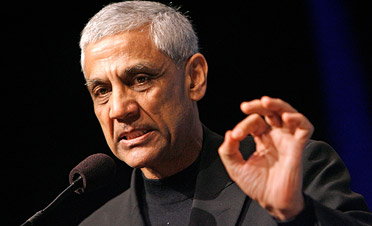Legendary venture capitalist Vinod Khosla ruffled a lot of feathers last year with his prediction that computers would soon replace a majority of the tasks that human doctors currently perform.
Doctors were predictably dubious. But Khosla isn’t backing down — far from it. In his upcoming fireside chat at our DataBeat/Data Science Summit, Khosla is going to focus on a data-driven, patient-centric model of health care.
Editor’s note: In addition to Khosla’s talk, the DataBeat/Data Science Summit features an amazing lineup of data visionaries, scientists, executives, academics, and journalists. Register today for a two day roadmap on how to approach data science to create real business value.
Khosla is a founder of Sun Microsystems, and he made his mark as one of the most successful investors during the Internet boom of the late 1990s by backing a string of huge networking equipment companies, including Juniper Networks, Siara, and Cerent.
He’s now running his own VC firm, Khosla Ventures, which has taken a wide-ranging approach to technology investing, focusing on alternative food sources, industrial-scale carbon capture, transportation, publishing, and more.
Health care is one of those industries that’s ripe for technological disruption, in Khosla’s view. We talk about the “practice of medicine” rather than the “science of medicine,” and for Khosla, that’s a problem that can we can fix with more data.
Health care should be much more scientific and data-driven, but that’s hard for the average physician to pull off without the support of tech tools. Technology makes up for human deficiencies and amplifies strengths. Automated health care will amplify physicians’s diagnostic and prescriptive skills by arming them with more complete, synthesized, and up-to-date research data, all leading to better patient outcomes.
Next-generation medicine will be based on scientific diagnoses, using real tests of what’s actually going on in your body. It will provide treatment options that take into account the data from a wide body of research and patient monitoring, as well as the unique characteristics of your own body. It will be much more personalized than your physician can currently provide.
This transition will start with “point innovations” — small, incremental inventions that seem immaterial at first, like wireless pedometers and wristwatches that constantly monitor your blood pressure and other vital signs. But when there are enough of these small innovations, they will integrate with each other and start to feel like a revolution.
Eventually, this shift in how health care is delivered will allow the medical industry to spend less money on capital equipment, cutting health care costs. It will enable us to provide care to those who don’t have it now. And it will all us to stop simple problems in their tracks, curing them before they get worse.
Related Articles
- Vinod Khosla: VCs should hush up because they ‘haven’t done sh*t’ (venturebeat.com)
- Why hospitals will soon sequence the genes of every single patient (venturebeat.com)
- Vinod Khosla says get rid of experts and invent the future you want (video) (venturebeat.com)
- HealthTap scores $24M from Khosla & others, former Square COO Keith Rabois joins board (venturebeat.com)
For full info on the upcoming DataBeat/Data Science Summit, go here. Tickets are very limited. Grab yours today!
Thanks to the following industry leaders for supporting DataBeat/Data Science Summit: Pivotal as Platinum Sponsor; Apollo Eductation Group as Gold Sponsor; SiSense as Silver Sponsor; and Gainsight as Contributing Sponsor. For sponsorship information, contact sponsors@venturebeat.com.


